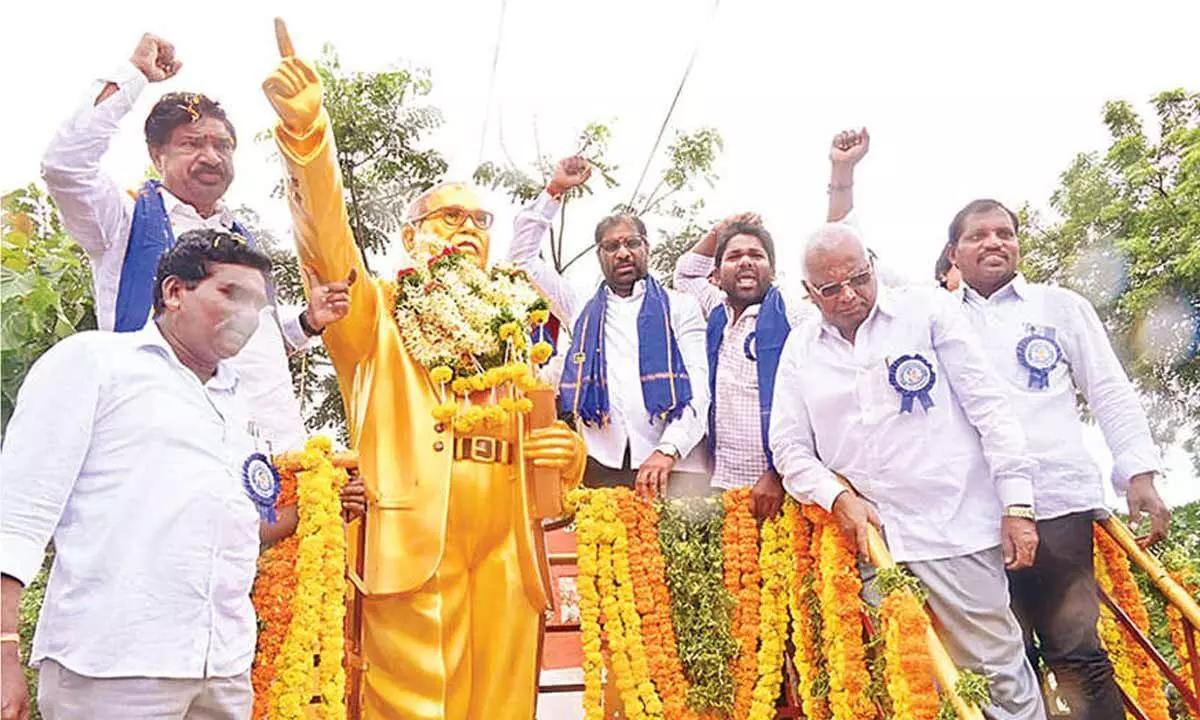 Image Source: The Hans India
Image Source: The Hans India
Key Highlights
A grand public ceremony was held in Muchonipalli village, Gattu Mandal, Gadwal constituency, to unveil a new statue of Dr B R Ambedkar, the architect of India’s Constitution, drawing enthusiastic participation from community leaders, activists, and local villagers.
Chief guests included Padma Shri awardee and MRPS Founder-President Mandakrishna Madiga, and senior BRS Party leader R Kishore of Jogulamba Gadwal District, both of whom honored Ambedkar’s vision and legacy.
The event became a platform to reflect on Ambedkar’s journey from social discrimination to the nation’s highest intellectual stature, emphasizing his commitment to justice, education, and equality.
Former Zilla Parishad Chairperson and Congress Party’s Gadwal Constituency in-charge Sarithamma led tributes to Ambedkar’s universal relevance, calling for greater adherence to constitutional values.
Speeches highlighted Ambedkar’s role in uplifting the marginalized, his advocacy for knowledge over conflict, and the urgent need for society to implement his teachings in daily life.
The Inaugural Event: Unity and Reflection
The unveiling ceremony in Muchonipalli transformed into a vibrant gathering symbolizing both pride and unity. Various community representatives attended, including:
Social justice leaders and local Congress and BRS functionaries.
Villagers expressed admiration for Ambedkar’s life story—how he overcame deep-seated caste prejudice through education, resilience, and unwavering pursuit of justice.
Leaders garlanded the statue and led prayers for an inclusive future, reinforcing Ambedkar’s status as a champion for the oppressed and a visionary for all Indians.
Tributes and Messages from Dignitaries
Padma Shri Mandakrishna Madiga delivered an impassioned speech, hailing Dr Ambedkar as a “walking encyclopedia,” an “embodiment of progress,” and the “soul of the Indian Constitution.” He described Ambedkar’s academic brilliance and determination in confronting adversity:
From humble beginnings, Ambedkar turned to books and learning as tools of empowerment—rising above ridicule, traveling across nations to master languages and legal expertise, and dedicating his life to the upliftment of the marginalized.
Madiga asserted that Ambedkar’s journey is a beacon for the young and disenfranchised—demonstrating that education and courage can dismantle the most entrenched social hierarchies.
Former ZP Chairperson Sarithamma’s address underscored Ambedkar’s pan-Indian significance. She reminded attendees:
Ambedkar’s genius lay not only in his struggle but in drafting a Constitution protecting every Indian, regardless of caste or creed.
Where others took to arms for justice, Ambedkar wielded intellect, shaping history non-violently.
Sarithamma also drew attention to present challenges: warning of growing systemic irregularities when constitutional principles are ignored, she urged all to defend the dignity of the marginalized by pursuing knowledge and justice.
Community Participation and Festivities
The event drew leaders like Shetty Atmakur Lakshman, Jammiched Anand, Balakrishna Naidu, and numerous local Congress and community representatives, signifying cross-sectional support for Ambedkar’s legacy.
Following the statue unveiling, participants engaged in community discussions, cultural performances, and readings from Ambedkar’s works, reinforcing his message of harmony, education, and equality.
Significance and Broader Impact
Ambedkar’s statue in Muchonipalli stands not just as a memorial but as a call to action:
It serves as a daily reminder of the social reforms Ambedkar championed and the unfinished task of ensuring justice and dignity for all.
The ceremony highlighted the continued resonance of Ambedkar’s call: to combat degradation, demand equality, and empower the next generation to pursue progress through learning, solidarity, and civic engagement.
Conclusion
The inauguration of Dr B R Ambedkar’s statue in Muchonipalli, Gattu Mandal, was both a solemn tribute and a forward-looking celebration of justice. It rallied diverse sections of society around the ideals of equality, compassion, and constitutional morality. As speakers and participants reiterated, Ambedkar’s vision remains as critical today as ever—lighting the path for an inclusive, empowered, and just India.
Sources: The Hans India
Advertisement
Advertisement








